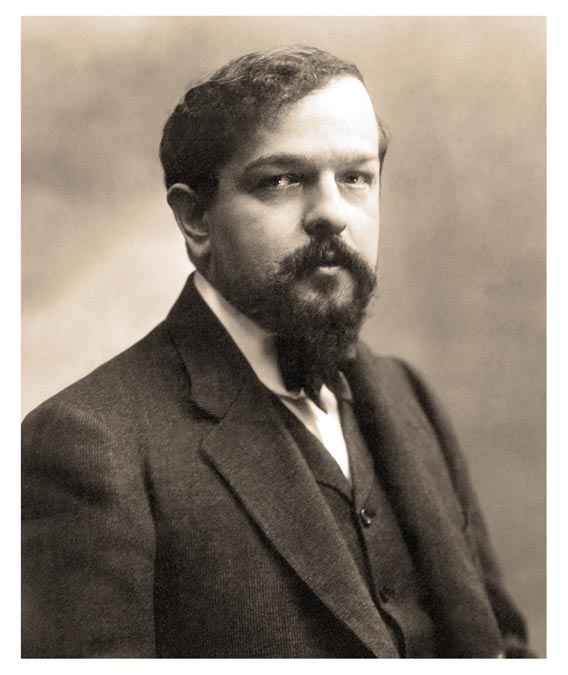
Listen to the beauty of Clair de lune and hear the majesty of Claude Debussy’s mastery. Enjoy his Afternoon of a Fawn and feel mesmerized by its tones. Or his Dialogue of the Wind and Sea and you can visualize the very image of a “wild grey ocean driven before an irresistible wind.” A Master. And masterpieces. Orchestra abstract patterns.

Debussy was born in the Parisian suburb of Saint-Germain-en-Laye August 22, 1862. His father sold china and his mother was thought to be volatile and ill-equipped to be a mother. Both recognized his musical ability and he began at age 10 attending France’s leading music college, the Conservatoire de Paris. He would achieve international fame in 1902 with his opera Pelleas et Melisande.
Debussy’s character was dreamy, reserved, alternately grouchy and gracious. As a young child he would sit closed in on himself, sitting in a chair thinking. No one knew of what.
He developed early a refined aesthetic sense and early a taste for fine food and art. He would cut illustrations from books and mount them on the walls of his room. At the Conservatoire his burning need to find expression for the sounds in his imagination were respected by some teachers, but not by others. When asked about the rules of harmony, he replied “at Mon Plaisir, My Pleasure.”
About 1880 Debussy began an affair with Marie Blanche Vasnier, a beautiful young woman married to a much older man. She was the dedication for most of his earliest songs between 1880 and 1884. He would have many strong love affairs and two marriages.
His L’enfant prodogue was seen by 22 Conservatoire faculty members as “a very definite sense of poetry, brilliant, warm coloring and lively, dramatic music.” Debussy later professed sorrow at winning, sensing that he would never again be free. Indeed, fame, with all its attendant miseries, found him at that moment.
He left Rome for Paris in 1887. He now had the resources to bring his talent to fruition and he no longer needed the conservatory. Debussy smoked heavily and liked to eat and drink. He was an excellent cook. By all accounts this extraordinary artist was a “shy, guarded, blunt, prickly, man.”
In his Printemps, the music is tender, sweet and charming. It opens in a steady upward arc from the still opening of the first movement to the triumphal dance that ends the second. The opening describes a slow awakening from wintry rigor. Sounding a bit like a high-class film score, it builds to a brassy, choreographic, climax.
He insisted on the sound as the dominant element in his music. He conceived his music in terms of pure timbre and this joy of shimmering sound, imagined for its own sensuous beauty, overwhelmed his followers.
Debussy secured a Summer job in 1879 as resident pianist at the Chateau de Chenoneau, where he rapidly acquired a taste for luxury that would remain with him all his life. There were money troubles. He could be less than diligent in his work and given to depression. In 1913 Debussy travelled to Russia and there were tours of Italy, Holland and Belgium, in 1914. The trips were wearing to the composer who was ill and concerned about the onset of war. A cancer operation in late 1915 failed.
Debussy died from cancer at his home in Paris at age 55 after a composing career of a little more than 30 years. He left one child, a daughter, named Chouchou.

